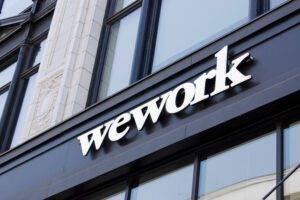
Shares in WeWork, the global office space-sharing company, have plunged after it raised “substantial doubt” about its future.
The company’s shares fell by close to 24% in extended trading in New York.
The firm said that it needed to raise additional capital to keep it afloat over the next 12 months.
WeWork, which is backed by Japanese tech giant Softbank, was hit hard by the pandemic as social distancing rules drove people to work from home.
However, it has yet to turn a profit, even after workers returned to offices as coronavirus restrictions eased.
On Tuesday, WeWork said in a statement that it faced challenges including softer demand and a “difficult” operating environment.
“Substantial doubt exists about the company’s ability to continue as a going concern,” the firm said.
It added: “The company’s ability to continue as a going concern is contingent upon successful execution of management’s plan to improve liquidity and profitability over the next 12 months.”
The plan involves raising additional capital through the issuance of stocks or bonds, or asset sales.
The management will also move to reduce rental costs and limit capital expenditures, WeWork said.
WeWork currently has 512,000 members at its workspaces in 33 countries around the world.
The company’s first attempt to go public collapsed in 2019 over concerns about its business model and co-founder Adam Neumann’s leadership style.
It was listed two years later in a deal that valued WeWork at $9bn. That was roughly a fifth of its estimated value in 2019.
The firm has also struggled to cope with troubles in the technology sector.
It has seen the exits of several top executives this year, including that of former chief executive and chairman Sandeep Mathrani.
In March, WeWork said it had struck deals with Softbank and other investors to reduce its debt by around $1.5bn.
Shares in the company have fallen by more than 95% in the last year. Shares fell by almost a quarter in extended trading on Wednesday to $0.21 (£0.16).
Read more:
WeWork raises ‘substantial doubt’ over future




